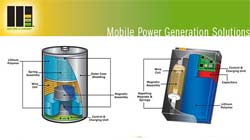They may seem like such small devices - but cellphones have a surprisingly large environmental footprint, and the whole cellphone charging business is a serious pain in the butt to boot. Every cellphone model seems to requires a different type of charger (so excessive amounts of plastic cords and gadgets need to be produced for each type of phone), they suck copious amounts of vampire power when you leave them plugged into the wall, and it is so easy to lose your charger or forget to charge your phone if you are on the road a lot.
Well, for those of you who hate the pain of cell-phone charging, there is now a promising new technology that could get rid of the messy problem of cellphone chargers once and for all, AND eliminate 30 to 40 percent of the toxic heavy metals that are currently found in cell-phone batteries. New startup M2E (Motion 2 Energy) has developed a technology which converts the kinetic energy from minor movement into an electrical charge to power mobile communication devices: meaning in just a few years, we could all toss out our cellphone chargers and charge up our phones simply by walking around with them during the day!
Kinetic energy generation has been around forever (remember wind-up watches?) and we’ve touched on it here with the handcrank electronics chargers of Freeplay , the Sustainable Dance Club, and the People-Powered Gyms. However what is so new and so promising about M2E is the fact that their microgenerator technology allows even the slightest jostling movement to provide a significant charge. So instead of having to hand-crank your cell phone (which is possible, but doesn’t sound too fun), your phone would simply just need a little minor jostling in your bag or jacket while you walk around to stay fully charged. Sounds a lot easier than having to plug in and recharge every night, right?.
Ghosn said the cars, with a range of up to 160 kilometres per charge, would have a top speed of 110 kilometres per hour: the top speed limit in Israel. And Aggasi vowed that, in the long run, the electric car would be cheaper to operate than one based on fuel.
Israeli leaders said they hoped the country would prove to be a trailblazer in the field of alternative energy. "This initiative will revolutionize cars in Israel and throughout the world," National Infrastructure Minister Binyamin Ben-Eliezer said.

